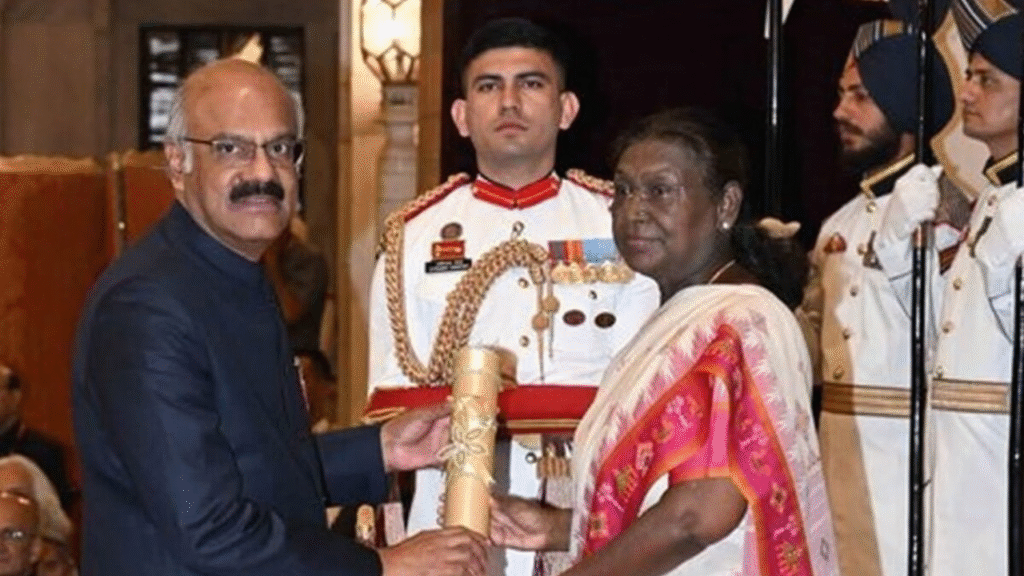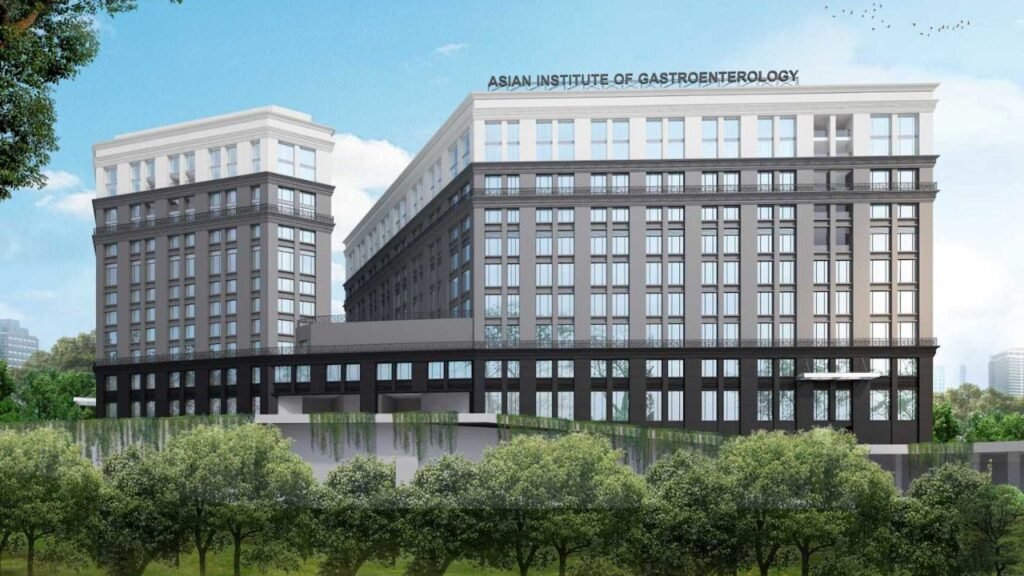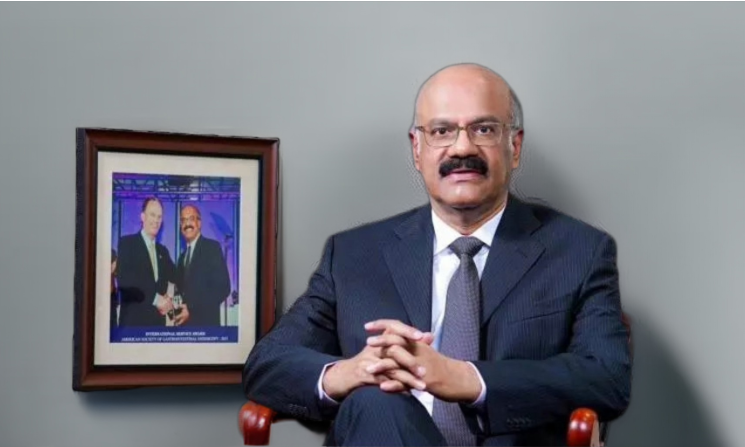Dr. Duvvur Nageshwar Reddy stands as a towering figure in Indian healthcare, becoming the first medical doctor in India to receive all three Padma Awards—Padma Shri, Padma Bhushan, and Padma Vibhushan. As the founder and chairman of the Asian Institute of Gastroenterology in Hyderabad, Dr. Reddy has revolutionised gastrointestinal care not only in India but across the globe, transforming the field of therapeutic endoscopy and making world-class healthcare accessible to millions.
Early Life and Family Background
Born on March 18, 1956, in Visakhapatnam, Andhra Pradesh, Nageshwar Reddy came from a distinguished lineage of medical professionals spanning three generations. His father, Dr. D.B. Reddy, was one of the youngest professors of pathology in India. His maternal grandfather, Dr. Govinda Reddy, served as a professor of Pathology and Medicine at Madras Medical College and maintained close friendship with Sir Alexander Fleming, the discoverer of penicillin. His paternal grandfather, the renowned Professor Dr. Jagganatha Reddy, further cemented the family’s medical legacy.
Despite this illustrious background, young Nageshwar was far from the model student his family might have expected. His childhood was marked by mischief and scientific curiosity that often led to disastrous results. In one memorable incident, his desire to understand how petrol burned resulted in accidentally setting fire to the family garage. In another episode that still brings smiles today, he placed his one-year-old brother inside a refrigerator, believing he was protecting him from the harsh summer heat.
These repeated escapades prompted his concerned parents to send him to boarding school at the age of seven—a decision that would prove transformative. At Hyderabad Public School, however, his academic struggles continued, culminating in his failure in Class X. His pathologist grandfather reportedly remarked that the boy would “at most become a car mechanic” given his academic record.
Yet this early failure ignited something within young Nageshwar. A teacher’s dismissive comment calling him a “useless fellow” became the catalyst for a lifelong determination to prove otherwise. This turning point marked the beginning of an extraordinary journey from academic underachiever to medical pioneer.

Education and Medical Training
Dr. Reddy’s academic transformation was nothing short of remarkable. He completed his MBBS degree from Kurnool Medical College, followed by an MD in General Medicine from Madras Medical College, Chennai. It was during his internal medicine training in Chennai in the early 1980s that his interest in gastroenterology first emerged.
The timing was fortuitous. Hepatitis B had just made headlines when Dr. Baruch Bloomberg, who discovered the virus, visited Madras. As a young medical student, Reddy found himself captivated by hepatology and gastroenterology. He successfully gained admission to the prestigious Postgraduate Institute of Medical Education and Research in Chandigarh, where he completed his DM in Gastroenterology in 1984.
At PGIMER, Dr. Reddy’s career trajectory took a decisive turn toward endoscopy. Under the mentorship of Professor Jung Mahidol Aviary, who had performed India’s first endoscopic extraction of common bile duct stones in the late 1970s, Dr. Reddy witnessed procedures that were revolutionary for that era. The sight of complex endoscopic interventions being performed by international experts on the big screen at conferences ignited his passion for therapeutic endoscopy.
His early research bore fruit quickly. In 1983, while still a fellow, Dr. Reddy published groundbreaking work on hepatitis B in pediatric populations in The Lancet, catching the attention of the legendary Professor Sheila Sherlock, who invited him to train with her in hepatology. However, fate had different plans, as Dr. Reddy’s growing fascination with endoscopy would ultimately define his career path.
Early Career and Building the Foundation
After completing his fellowship in 1984, Dr. Reddy returned to Hyderabad with a vision to establish academic excellence in gastroenterology. He joined Nizam’s Institute of Medical Sciences as an Assistant Professor of Gastroenterology, where he started from scratch—the institution had no gastroenterology department at the time. Dr. Reddy personally oversaw the purchase of the first endoscopes, which were still fibre-optic models in the mid-1980s.
Those early years were far from glamorous. Endoscopy units rarely had their own fluoroscopy machines, and Dr. Reddy often had to rely on the mercy of radiologists who would allocate one afternoon per week for procedures. He would transport all the endoscopes to the radiology department—a process that was neither hygienic nor efficient.
Despite these challenges, Dr. Reddy built a reputation for excellence. He subsequently served as a Professor of Gastroenterology at Guntur Medical College before returning to Hyderabad. However, working within government institutions proved frustrating due to bureaucratic regulations, insufficient funding, and limited access to advanced equipment. It was this frustration that ultimately drove him to establish his own institution.

Founding of the Asian Institute of Gastroenterology
In 1994, at the age of 38, Dr. Nageshwar Reddy took the bold step of founding the Asian Institute of Gastroenterology—a decision that would transform the landscape of gastroenterology in Asia. What began as a small day-care clinic in Somajiguda, Hyderabad, was built on a revolutionary concept: major endoscopic surgical procedures could be performed on an outpatient basis without requiring hospitalisation.
The initial years required immense perseverance. Starting with basic endoscopy services, Dr. Reddy and his small team performed complex therapeutic procedures that were rare in India at the time. The institute quickly gained recognition for its clinical excellence and patient-centric approach. Within a few years, AIG evolved into a full-fledged 300-bed speciality hospital offering comprehensive gastroenterology services.
By 2014, Dr. Reddy expanded his vision with the establishment of AIG Hospitals on a seven-acre campus in Gachibowli, Hyderabad. This state-of-the-art 800-bed super-speciality hospital was custom-designed to perform complex transplant surgery, including liver, kidney, heart, pancreas, and islet cell transplantation. Today, AIG comprises over 1,100 beds across two campuses and offers comprehensive healthcare services across eight Centres of Excellence, including Medical and Surgical Gastroenterology, Liver Sciences, Organ Transplant, Oncology, Cardiac Sciences, Renal Sciences, Pulmonary Sciences, and Obesity and Metabolic Therapy.
AIG’s growth has been extraordinary. From performing procedures for local patients, the institute now serves patients from over 20 countries, including Sri Lanka, Bangladesh, Malaysia, Nepal, and Middle Eastern nations. The hospital performs one of the highest numbers of ERCP procedures in the world annually.
Medical Innovations and Groundbreaking Contributions
Dr. Reddy’s contributions to gastroenterology extend far beyond building infrastructure. He has been at the forefront of introducing cutting-edge procedures to India and the Asia-Pacific region. His pioneering work includes several remarkable innovations that have changed the face of modern gastroenterology.
The NAGI Stent stands as perhaps his most celebrated invention. Dr. Reddy designed this biflanged metal stent used for endoscopic drainage of pancreatic fluid collections. This innovative device, developed in collaboration with Taewoong Medical, Korea, has saved countless lives by offering a minimally invasive alternative to traditional surgery. The NAGI stent with an electrocautery-enhanced delivery system has significantly reduced procedure times and complications.
In the realm of Natural Orifice Transluminal Endoscopic Surgery, AIG performed the world’s first transgastric appendectomy, introducing NOTES procedures globally. This groundbreaking technique allows surgeries to be performed through natural body openings, eliminating external incisions and reducing patient recovery time dramatically.
Dr. Reddy introduced numerous procedures to India for the first time, including GERD-X, STRETTA, POEM, G-POEM, STERR, ESD, EMR, Endoscopic Sleeve Gastroplasty, and various interventional gastroenterology procedures. Each of these techniques has expanded treatment options for Indian patients who previously would have required invasive surgery or expensive overseas treatment.
His research focuses on therapeutic pancreato-biliary endoscopy and innovations in transgastric endoscopic surgery. His work on Extracorporeal Shock Wave Lithotripsy for difficult common bile duct stones has set new standards for non-invasive treatment approaches.
Academic Excellence and Global Recognition
Dr. Reddy’s academic output is truly staggering. He has authored over 1,050 peer-reviewed research papers published in prestigious national and international medical journals. His work appears regularly in publications like The Lancet, Gastrointestinal Endoscopy, Endoscopy, and World Journal of Gastroenterology.
He has contributed chapters to more than 50 international gastroenterology textbooks and edited 18 GI endoscopy textbooks. His publications cover a vast range of topics, from bacterial diversity in gut health to advanced therapeutic endoscopy techniques, from tropical calcific pancreatitis genetics to inflammatory bowel diseases.
Dr. Reddy serves on the editorial boards of multiple prestigious journals and is a peer reviewer for The Lancet and other leading medical publications. His commitment to medical education is reflected in his role as a visiting professor at Harvard Medical School, Johns Hopkins University, Era Same Hospital in Brussels, and Fujigoka Hospital in Tokyo. He has been a visiting faculty member for over 200 international endoscopy workshops and has trained more than 500 endoscopists at AIG.
Rural Healthcare and Social Impact
While Dr. Reddy’s clinical excellence earned him international acclaim, his commitment to social equity in healthcare truly sets him apart. Recognising that nearly 70 per cent of India’s population lives in rural areas with limited access to advanced medical care, Dr. Reddy launched the Rural Health Care Project in the early 2000s.
This innovative initiative converted buses into mobile hospitals equipped with custom-made endoscopy units and basic diagnostic facilities. These mobile units, accompanied by telemedicine vehicles that transmit procedures and data to AIG’s main centre in Hyderabad, have travelled to the remotest villages of Andhra Pradesh and Telangana.
To date, this program has performed over 32,000 endoscopic procedures across 4,837 villages, serving a population of over 10 million people. The mobile units have saved countless lives, including that of a pregnant woman who was coughing blood due to an oesophagal tear—she received immediate endoscopic clipping that stopped the bleeding and saved both mother and child.
Through the Asian Healthcare Foundation, which Dr. Reddy founded, these mobile endoscopy units continue to bridge the rural-urban healthcare divide, bringing life-saving diagnostics and treatment to underserved communities. Dr. Reddy also established the GI Endoscopy Technician Program, which has trained thousands of skilled technicians, ensuring quality endoscopy care across India.
Leadership During the COVID-19 Pandemic
During the COVID-19 pandemic, Dr. Reddy and AIG Hospitals played a crucial role in India’s healthcare response. The hospital developed critical treatment protocols for gastrointestinal symptoms in COVID-19 patients and spearheaded research on monoclonal antibody therapy.
In a landmark study published in 2021, Dr. Reddy’s team demonstrated that the REGEN-COV monoclonal antibody cocktail was 100 per cent effective in preventing severe disease and deaths among COVID-19 patients infected with the Delta variant. This research, conducted when India was reeling from the devastating second wave, provided crucial evidence for treatment strategies and saved countless lives.
AIG Hospitals ensured affordable COVID-19 care, provided free treatment for frontline healthcare workers, and contributed to vaccine strategy optimisation. Dr. Reddy’s scientific leadership helped shape India’s national pandemic response, demonstrating that clinical excellence must be coupled with social responsibility.
Awards and Honours: A Testament to Excellence
Dr. Nageshwar Reddy’s contributions have earned him an extraordinary array of national and international honors, making him one of the most decorated doctors in India.
National Civilian Awards include the B.C. Roy Award in 1995, India’s highest medical honour from the Medical Council of India. He received the Padma Shri in 2002, India’s fourth-highest civilian award, followed by the Padma Bhushan in 2016, the third-highest civilian award. Most recently, in 2025, he was conferred with the Padma Vibhushan, India’s second-highest civilian award, making him the first Indian doctor to receive all three Padma awards.
International Recognition has been equally impressive. He received the Master Endoscopist Award in 2009 from the American Society for Gastrointestinal Endoscopy, considered the Nobel Prize of Endoscopy. In 2021, he was honoured with the Rudolf V. Schindler Award, ASGE’s highest honour, awarded to only two non-Americans in history. He became the Master of the World Gastroenterology Organisation in 2014, the world’s highest gastroenterology award.
In 2025, he became the first Indian to receive the Legends of Endoscopy Award from Japanese gastroenterologists at Tokyo Live Global Endoscopy. He has also received the Distinguished Educator Award from the American Gastroenterological Association, Johns Hopkins University’s Captain’s Chair, and a fellowship from the American Association for the Advancement of Science.
Professional Distinctions include fellowships from the National Academy of Medical Sciences India, Royal College of Physicians of Ireland, American Society of Gastrointestinal Endoscopy, American College of Gastroenterology, and American Gastroenterological Association. He holds honorary memberships in societies across the Philippines, Hong Kong, Singapore, Indonesia, Colombia, and Hungary, and has received honorary Doctor of Science degrees from Nagarjuna University and the Institute of Liver and Biliary Sciences.
He served as Past President of the World Endoscopy Organisation, President of the Society of Gastrointestinal Endoscopy of India, and Chairman of the World Endoscopy Organisation Research Committee. Notably, Dr. Reddy is the only endoscopist in the world to receive five ASGE Crystal Awards, cementing his status as a global leader in the field.
Personal Life and Philosophy
Dr. Nageshwar Reddy is married to Dr. Carol Ann Reddy, a dermatologist whom he met at Madras Christian College. The couple has one daughter, Sanjana, who chose a career in engineering and currently lives in the United States with her family. Dr. Reddy has publicly acknowledged that his one regret is not spending enough time with his family during his daughter’s growing years, though he hopes to correct this as the next generation of doctors he has trained takes over the institute’s day-to-day operations.
Despite—or perhaps because of—his medical background, Dr. Reddy does not believe in religion or the concept of an afterlife. He has stated emphatically that religion has only succeeded in increasing crime, hatred, bigotry, and divisiveness among people. For Dr. Reddy, the reward for his work lies in the work itself, not in promises of divine reward.
His work ethic is legendary. Dr. Reddy maintains an 18-hour workday ritual that he has followed for decades. “You never feel tired when you love what you do,” he explains. His regimen includes daily exercise and a 15-minute afternoon nap that keeps him mentally and physically alert.
His philosophy on medicine is profoundly humanistic. Healthcare is not just about curing illness; it’s about serving humanity with dignity and empathy. He has observed that faith plays a remarkable role in healing, noting that the same medicine prescribed by two different doctors works for the patient when he has faith in the doctor and fails when he lacks it.
As he looks toward the future, Dr. Reddy’s vision is clear: he wants to give more and more and take less. His commitment to affordable healthcare remains unwavering—AIG offers treatments at 20 to 30 per cent lower prices than market rates while maintaining world-class quality.
Business Growth and Institutional Excellence
AIG Hospitals has experienced remarkable financial and operational growth under Dr. Reddy’s leadership. In 2019, when Quadria Capital acquired a 30 per cent stake, the hospital’s estimated valuation stood at approximately 378 million dollars. By 2021, private equity reports valued AIG at roughly 600 to 670 million dollars. By 2025, following strategic expansion including a major investment in a state-of-the-art oncology centre with proton therapy, AIG’s valuation is estimated to have grown to an estimated 900 million dollars, representing a 138 per cent growth since 2019.
The hospital’s revenue has grown more than five times since 2016, with patient volumes nearly tripling from 140,000 to over 400,000 annually. AIG Hospitals currently employs over 2,400 professionals and operates more than 1,100 beds across two campuses in Hyderabad. The hospital is recognised as one of 17 Centres of Excellence worldwide by the World Gastroenterology Organisation—the only Indian hospital to hold this distinction.
Legacy and Impact on Indian Healthcare
Dr. D. Nageshwar Reddy’s journey from a mischievous child who failed in school to becoming India’s most decorated medical doctor embodies the transformative power of determination, passion, and purpose. His story challenges conventional narratives about success—proving that early academic failure does not determine one’s destiny.
His impact extends across multiple dimensions. Through innovative procedures and medical devices like the NAGI stent, Dr. Reddy has directly saved thousands of lives and improved outcomes for millions of patients worldwide. Having trained over 500 endoscopists and thousands of technicians, Dr. Reddy has multiplied his impact exponentially. His students now practice across India and neighbouring countries, spreading his philosophy of compassionate, high-quality care.
By making world-class gastroenterology accessible at affordable prices and bringing mobile medical units to rural India, Dr. Reddy has demonstrated that excellence and inclusivity are not mutually exclusive. With over 1,050 publications and numerous medical innovations, he has advanced the global body of knowledge in gastroenterology and therapeutic endoscopy.
AIG Hospitals stands as a model of clinical excellence, ethical practice, and financial sustainability—proving that private healthcare can be both profitable and socially responsible.
Continuing the Mission
At 69, Dr. Reddy continues to perform complex procedures, publish research, mentor young doctors, and expand AIG’s capabilities. His recent investments in robotic surgery, artificial intelligence, and advanced cancer care demonstrate his forward-thinking approach. Collaborating with institutions like IIIT Hyderabad, IIT, and IISc, he continues to develop innovative diagnostic and therapeutic tools.
“This recognition belongs to my patients, my entire team at AIG Hospitals, and the countless healthcare workers who inspire me daily,” Dr. Reddy said upon receiving the Padma Vibhushan. “This is not just a personal milestone, but a celebration of Indian medicine and our nation’s immense potential in healthcare innovation.”
As a proud son of Telugu soil who rose from Visakhapatnam to global prominence, Dr. D. Nageshwar Reddy remains committed to ensuring that India continues to lead in medical excellence. His life reminds us that greatness often emerges not from privilege or early success, but from resilience, passion, and an unwavering commitment to serving others.
The boy who was once dismissed as a failure and told he might become a car mechanic at best has instead become a beacon of hope for millions—proving that with determination, innovation, and compassion, one person can truly change the world of medicine. Dr. Reddy’s story is not just about medical breakthroughs; it is about human potential, about refusing to accept limitations, and about dedicating one’s life to the service of humanity.
References:
- https://www.pancreas2025.org/nageshwar-reddy-duvvur
- https://aighospitals.com/awards-publication/dr-d-nageshwar-reddy-padma-vibhushan-award
- https://www.newindianexpress.com/cities/hyderabad/2025/Jan/26/dr-d-nageshwar-reddy-conferred-padma-vibhushan-1st-indian-doctor-to-receive-all-three-padma-awards
- https://en.wikipedia.org/wiki/D._Nageshwar_Reddy
- https://www.deccanchronicle.com/360-degree/dr-d-nageshwar-reddy-becomes-first-doctor-to-achieve-all-three-padma-awards-1856686
- https://www.financialexpress.com/life/lifestyle-dr-d-nageshwar-reddy-becomes-indias-first-triple-padma-awardee-says-asian-institute-of-gastroenterology-3910243/
- https://www.drkaminirao.com/dr-nageshwara-reddy.php
- https://medicaldialogues.in/news/health/doctors/aig-hospitals-chairman-dr-nageshwar-reddy-honoured-with-legend-of-endoscopy-award-in-tokyo-146724
- https://www.youtube.com/watch?v=_xDqGgVP5qg
- https://apdw2025singapore.com/speakers/prof-nageshwar-reddy/

